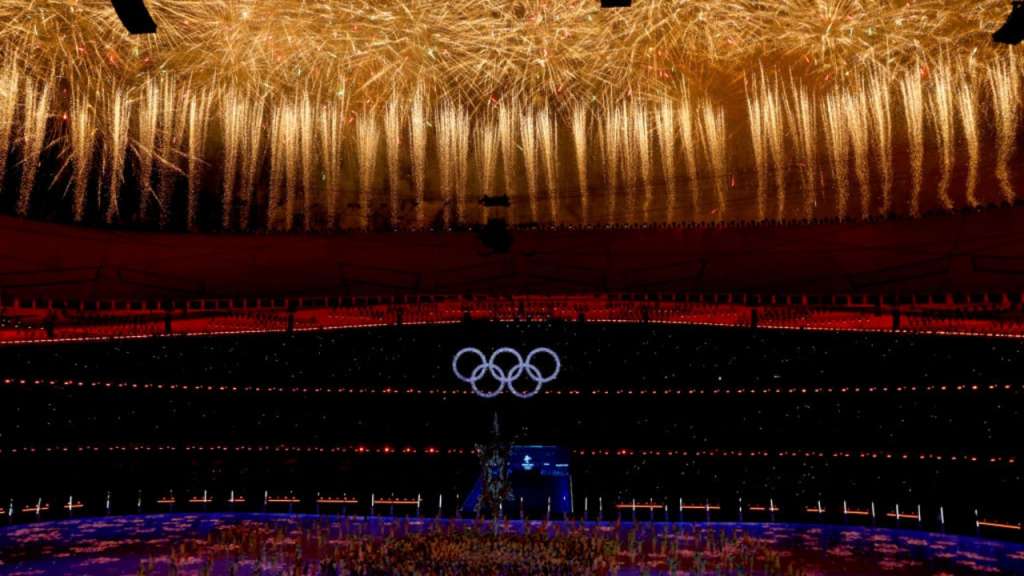
Image: Olympics
The Beijing Winter Olympics ended on Sunday, ending a memorable event marked by coronavirus restrictions and geopolitical tensions as much as thrilling competitions and emotional moments.
The event culminated with singing and the burning of the Olympic flame at Beijing’s famed Bird’s Nest stadium.
Snowflake lights flew out of the stadium, while explosions spelled out “One World, One Family.” People danced on the stadium floor to “Auld Lang Syne”.
As with the opening ceremony, the closing ceremony was streamlined in comparison to the 2008 Summer Games, with an emphasis on children, Chinese tradition, and everyday people.
Earlier in the ceremony, flag bearers from the participating countries entered the stadium, followed by delighted athletes, many clutching their phones in anticipation of capturing the moment. After organizers indicated they would not sell tickets to the general public, a small but enthusiastic gathering of invited visitors gathered.
Beijing passed the baton to Milan and Cortina d’Ampezzo in Italy, which will host the 2026 Winter Games, after becoming the first city to stage both summer and winter competitions.
Two children, one from Cortina and one from Milan, then rolled a globe through cracking ice to symbolize the planet’s precarious status.
Beijing’s coronavirus restrictions were the tightest yet for the Games. Additionally, this year’s Games were distinguished by a diplomatic boycott led by the United States over China’s human rights record, tensions between Russia and Ukraine, and a high-profile doping scandal involving a 15-year-old figure skating superstar.
The ceremony was helmed by acclaimed Chinese filmmaker Zhang Yimou, who previously planned the opening ceremony for the 2008 Summer Olympics, as well as the extravagant opening and closing ceremonies.
International Olympic Committee President Thomas Bach lauded the competitors’ sportsmanship in a speech concluding the Games.
“You not only respected one another; you also supported and hugged one another, despite the fact that your countries are split by conflict,” he remarked. “May your example of collaboration and peace influence political leaders throughout the world.”
Bach also urged the international community to ensure that individuals everywhere have equal access to Covid vaccinations.
“If we are to finally defeat this pandemic, we must be faster, aim higher, stronger, and united,” he stated.
Sunday’s ceremony brought to a close two weeks of drama that saw the birth of Olympic heroes and the rewriting of record books.
Erin Jackson became the first Black woman to win a gold medal in speedskating for the United States. Jackson won after tripping during Olympic tryouts, and her friend and fellow skater Brittany Bowe offered her a seat in Beijing.
Nathan Chen also shone brightly for the United States. He won the gold medal in men’s figure skating singles, becoming the first Asian American man to do so.
Eileen Gu, a native of the United States who was already a celebrity prior to the Games, became a national hero in China after winning two gold medals and a silver for the host country.
There were also some more humiliating instances.
Shaun White of the United States, the face of modern winter sports, ended his Olympic career last week in Beijing without winning a medal.
The Games were also dogged by a long-running scandal. This month, reports surfaced that Russian figure skating star Kamila Valieva tested positive for a prohibited cardiac medicine prior to the Games. Valieva, 15, lost out on a second gold medal on Thursday and faces elimination from the team event if she is deemed to have committed a doping violation.
One of the subjects that dominated news in the run-up to the Games was China’s treatment of ethnic Uyghurs, which the US government has labeled as genocide. Beijing has frequently denied any maltreatment of the predominantly Muslim minority, maintaining that its measures in the western region of Xinjiang were made in the sake of counterterrorism.
Chinese officials sent a stern message to foreign leaders boycotting the Games at the opening ceremony by selecting a Uyghur cross-country skier from Xinjiang to deliver the ceremonial torch, a moment that frequently has symbolic weight.
Additionally, a meeting between Bach, the International Olympic Committee’s president, and Peng Shuai, the Chinese tennis star who vanished from public view last year after appearing to accuse a former top government official of sexual assault, was noteworthy. During the Games, Peng denied making the allegation in a monitored interview with the French daily L’Equipe.
A journalist for L’Equipe who interviewed Peng afterwards stated that he could not confirm whether she was indeed free and safe.
Additionally, Russia’s massing of soldiers on the Ukrainian border punctured the Olympic bubble.
The coronavirus outbreak, which began in the Chinese city of Wuhan, loomed over the Games as well, with testing confusion and concerns about quarantine conditions adding another layer of stress to participants who were already apprehensive. Athletes and their teams submitted complaints with Beijing’s so-called quarantine hotels about their treatment and living conditions.
Norway, a country with a population of less than 5 million, once again lead the medal count. Russia was followed by Germany, Canada, and the United States. China won 15 medals, up from nine at the 2018 Winter Olympics in PyeongChang, South Korea.
Fear not, as the curtain comes down on two weeks of Olympic drama. While these Games have concluded, the Beijing Paralympics continue.
Subtitle
Related Posts
Some description text for this item
